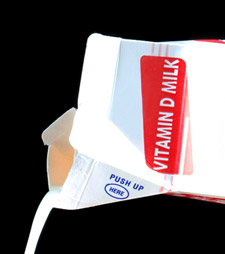Did You Know...
04/29/2009
Furci Home / Fitness Channel / Bullz-Eye Home
A column by Mike Furci that brings you research, trends and other info to help you with your fitness, health and nutritional needs.
 ... there are more than 800 scientific articles showing the effects of vitamin D on cancer? Some researchers point out that increasing vitamin D levels world-wide could prevent numerous diseases that claim nearly 1 million lives per year. Vitamin D, or the “sunshine vitamin,” is really not a vitamin, but a powerful hormone precursor that has an enormous influence on our bodies. Receptors that respond to the vitamin have been found in almost every human cell. Researchers have found that vitamin D has a direct influence on 3,000 of your 30,000 genes.
... there are more than 800 scientific articles showing the effects of vitamin D on cancer? Some researchers point out that increasing vitamin D levels world-wide could prevent numerous diseases that claim nearly 1 million lives per year. Vitamin D, or the “sunshine vitamin,” is really not a vitamin, but a powerful hormone precursor that has an enormous influence on our bodies. Receptors that respond to the vitamin have been found in almost every human cell. Researchers have found that vitamin D has a direct influence on 3,000 of your 30,000 genes.
The health benefits of optimal vitamin D levels are absolutely extraordinary. The main reason it’s not more widely promoted is there is no money to be made from it by the medical and pharmaceutical industries.
... obesity not only causes poor metabolic health but bad sex in both genders? Obesity has enormous physiological consequences for both men and women. By the time an obese person reaches 40, their life expectancy will decrease by seven years. Obesity is an independent risk factor for heart disease and also increases the incidence of other risk factors like type II diabetes, insulin resistance, dyslipidemia and hypertension. This cluster of risk factors, including central obesity, is referred to as metabolic syndrome. Four out of the five risk factors for this syndrome are risk factors for erectile dysfunction. Overweight and obesity may increase the risk of ED by 30 to 90 percent as compared with normal-weight subjects. (“International Journal of Impotency research", 2008)
... soy foods contain isoflavones that bind weakly to estrogen receptors that negatively affect the male reproductive system? There is a statistically significant trend toward decreasing sperm concentration with increasing soy food intake. A study of 99 male subjects showed that the men who had the highest soy food intake had the lowest sperm counts. Soy intake did not affect ejaculate volume, sperm motility or structure. The negative effects of soy were greatest in obese men and those who ate the most soy. If this is the effect soy has on adult males, imagine the effects it has on developing children. (“Human Reproduction” 2008 23(10))
... going to the gym or other training facilities can increase your potential for infection? Gym members, high school, college and pro athletes have contacted infections including staph and the potentially deadly MRSA that’s immune to antibiotics. It’s not clear where these infections originate, but athletes and people who work out are at risk because they share equipment.

There are precautions you can take to protect yourself at the gym:
- Make sure the equipment is clean. A well-run facility will clean the equipment, but be proactive.
- Do not share. Get your own personal equipment like towels and yoga mats.
- Do not touch your face while training. Wash your hands when you’re done.
- Protect your feet from fungal infections and wear flip flops in the shower. Don’t use a communal bar of soap.
- Shower right after you exercise. Don’t wear the clothes for an extended period of time if you used training equipment or participated in a contact sport.
- Shower right after using a sauna or whirlpool; don’t use them if you have a cut or a scrape.
- If a scratch or a cut becomes red, hot or tender, have it checked.
... cardiologists have finally admitted cholesterol levels do not reflect cardiovascular disease risk? Dr. James Stein, M.D., from the University of Wisconsin Medical School in Madison, praised the JUPITER study for exposing the fact that current therapeutic LDL-cholesterol levels are not only arbitrary, but are in fact a poor indicator of cardiovascular disease risk. “Most patients with heart attacks have normal cholesterol values,” he stated. With the cholesterol theory crumbling, the industry is under intense pressure to come up with a new risk factor, and one that can be treated with the same statin drugs they have invested so much money in. Enter Dr. Ridker and C-reactive protein (CRP). Ridker has been pushing treating CRP with statins for years. But is CRP a risk factor? A national panel on CRP found no evidence that treating CRP levels will improve survival rates. Elevated CRP levels are associated with many things, including anger, stress, arthritis, cancer, lupus, pneumonia, tuberculosis, oral contraceptive use, pregnancy, heart attacks, surgery, trauma, intense exercise, etc. It’s a marker for disease, not the cause. But since statins lower CRP levels slightly, you can count on CRP becoming the new cholesterol. The public will be made to fear CRP, be tested for it, and be put on dangerous statins to lower it. What a racket.
You can follow us on Twitter and Facebook for content updates. Also, sign up for our email list for weekly updates and check us out on Google+ as well.













